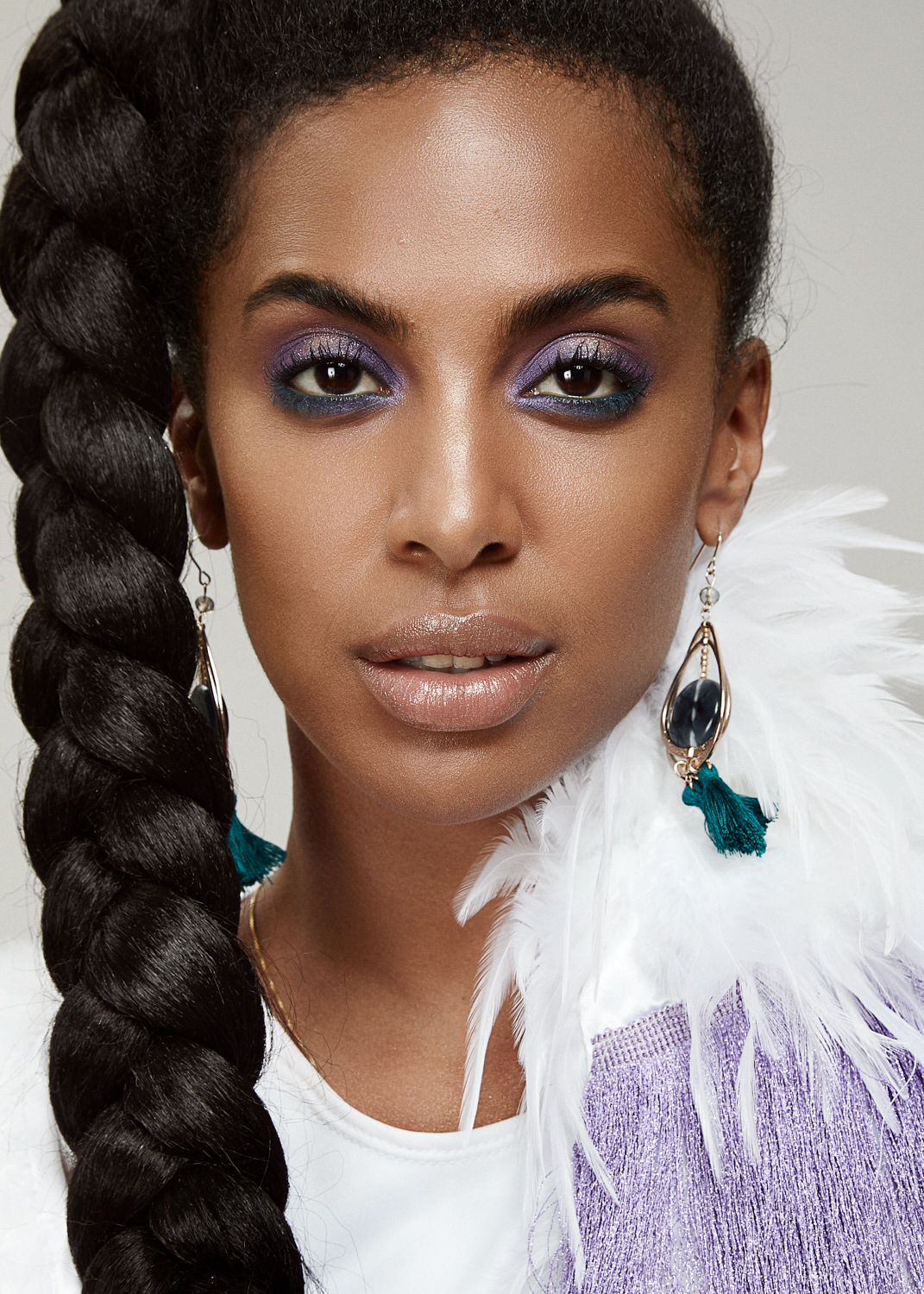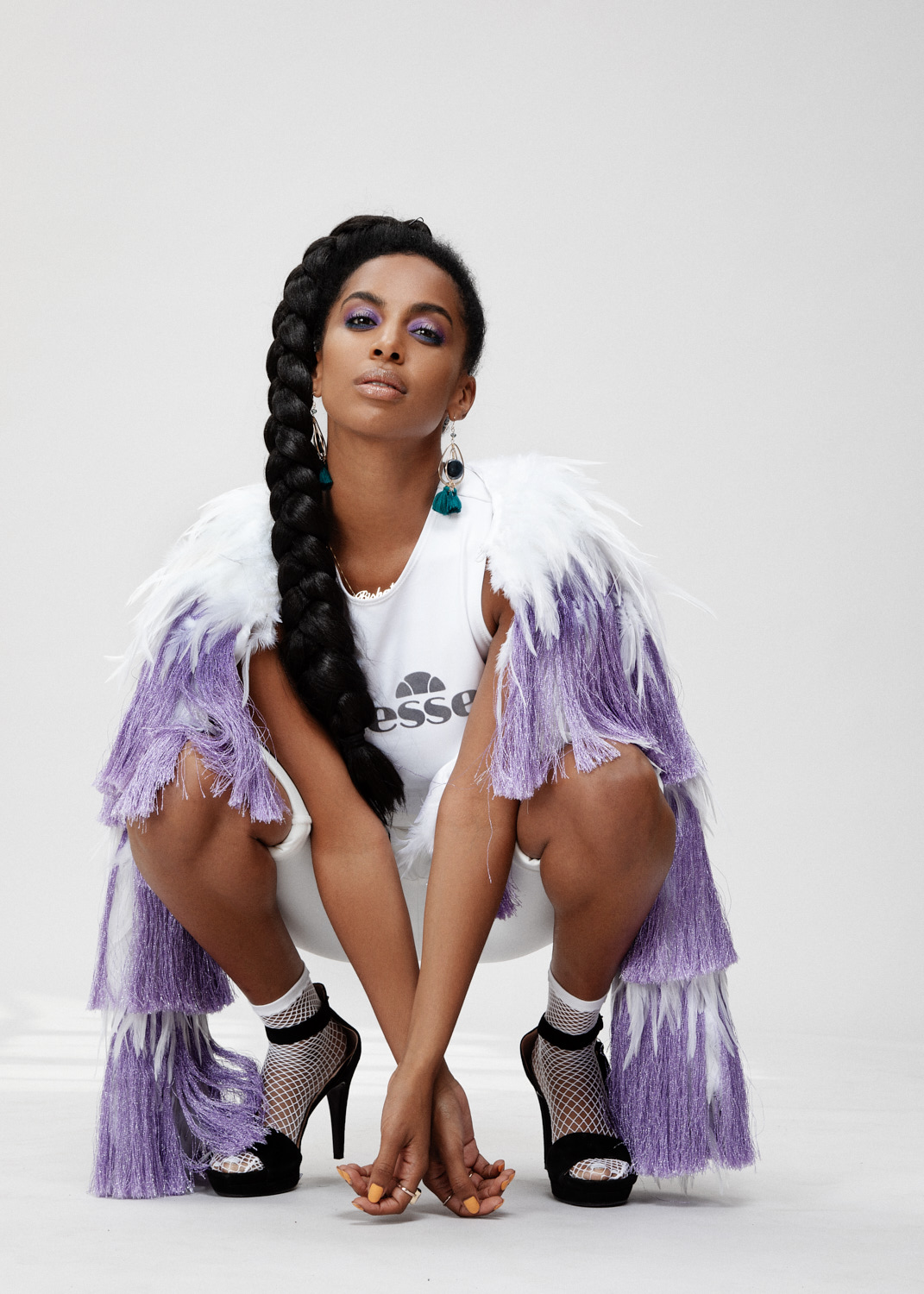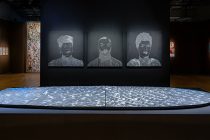It’s a sunny spring day in Stockholm and I’m sitting in a little café talking to BISHAT ARAYA, an up and coming Swedish singer who mixes catchy pop melodies with deep and sometimes agonisingly truthful lyrics. Over a typically Swedish fika, I get to know more about this bubbly but ambitious performer.

body suit ELLESSE; feather jacket PELLOBELLO; earrings STYLIST’S OWN
We already live in a society where there’s so much pressure to be perfect, but for me it’s about being transparent and real
Bishat grew up with her mother and brother in Gothenburg, in the south of Sweden, and from an early age her life was immersed in music. She reminisces “When I was growing up, my mum would always be singing and dancing, so music was always a part of our household. If we were down she’d put on some music and it would bring us together.” As a 4-year-old, Bishat remembers going to a jazz festival with her family and wanting to be on stage so much that she convinced people to carry her forward before depositing her on the stage. Even as a young child, performance was in Bishat’s blood and throughout this interview I can see that this passion has stayed with her through her life.
At 13 Bishat wrote her first song with the support of her brother’s friend [José Gonzáles] who not only played the guitar for her but gave her advice on writing personal and meaningful songs. After performing the song at her school’s graduation, and hearing the compliments and support from her peers, she knew that this was what she meant to do. She tells me “I felt early on that I needed to do things by myself and I particularly needed to learn how to play instruments. So, I got a really dusty old piano that my music teacher at school hooked me up with, so I could learn how to play and write my songs”.
This work ethic and passion for music fueled Bishat’s decision to risk everything and move to London by herself at the age of 18. She attended the Arts Educational Schools London – a performing arts school where she was trained in singing, dancing, and acting. Bishat’s glimpses of an early independence and self-belief is clear when she recalls “[ArtsEd] was hardcore but it taught me discipline and hard work. Even if they said some things that might not have been right for me, what I learned was just to be my own person and to listen to my body and myself. It was a hard lesson to learn but I feel that it has set me up well.”
After graduating from ArtsEd and spending a year in Germany performing in Hairspray the musical, Bishat returned to London, training under the guidance of leading vocal coach Lorna Blackwood (now vocal coach for such artists as Dua Lipa and Mabel). However, that same ambition and drive took her to Stockholm. She explains “The industry here is easier to get into, it’s a smaller business, so I came here and began working with some musicians. I realised that I didn’t need to look elsewhere, I needed to first look inside myself, and then find the people to provide the skills I didn’t have. I ended up getting a job at Universal which got me connected to lots of people, and which helped me to figure out all sides of the industry. Eventually I quit and started my own label. It has been a long way around and has taken forever, but now I feel that everything I’ve released is me.”
That’s a common thread when I get to know Bishat, her independence and self-assurance in her artistry. For her it’s important that now people can see her, understand her vision, and feel connected enough to work with her because they genuinely believe in her music. And she’s clearly succeeding, with a string of gigs across Sweden, including supporting Hippie Sabotage, an EDM duo who have performed with artists like Ellie Goulding and Tove Lo.

shirt & pants F.A.S.; socks BECK SÖNDERGAARD; shoes TAMARIS; necklace BISHAT’S own
Bishat’s music itself has been described as ‘Pop for Sad Hearts’ and she herself summarises the sound as Scandinavian electro-pop with RnB influences. Listening to her new mixtape [“Q417” – named for the 4th Quarter of 2017 which is when she wrote it] I get the moody and sultry vibes, as well as her honest and unfiltered lyrics. In fact, I get the impression that Dark Pop is a phrase that describes not only her music, but her personality too. When listening to the mixtape you can hear that there’s a story behind the lyrics and when asked about what inspired it, Bishat talks about coming out of a long-term relationship, being unsure about her music career, but then coming out the other side. Listening, I can identify with the stages she weaves into the mixtape – as she puts it “those euphoric but kind of destructive nights out, to those nights when you run through the woods to the top of the mountains and just scream, to those sexy intimate nights in a corner of a bar, to when you’re alone, finally just stop running, and realise ‘This is where I am at now, I have to accept it and move on’.”
Bishat’s music also seems to reflect a wealth of musical influences and she becomes even more animated when discussing her inspirations. “Alicia Keys’ first album changed my life” she exclaims. “I was in a not so very diverse school in Gothenburg. I was studying music and everything was classical or jazz – which I loved but it wasn’t what I wanted to do. So, when [Alicia] – a young, gorgeous, talented, badass female – came and infused RnB and Pop with classical music, she was my inspiration. I used to sing and play her songs on the piano, and for a really long time, she was my biggest musical influence.” Other artists like Erykah Badu and Lauryn Hill were also role models for Bishat, particularly important being a ‘little black girl in the south of Sweden’. For Bishat, as is for many other young people from ethnically diverse backgrounds, it was important to see artists who looked like her and who were influenced by Soul and RnB, making them contemporary.

earrings STYLIST’S own; body suit ELLESSE; pants GINA TRICOT; socks H&M; shoes TAMARIS
On that note, I ask Bishat whether being a black woman in the Swedish music industry has ever affected her and she pauses to think, before shaking her head. “There’s not much that’s happened that has made me think, this must be because I’m a black woman. However, you do notice things, like when people label me as ‘soul’ and I’m like ‘I’m pretty f*cking pop, but ok sure…!’ People can tend to assign your genre based on your skin colour. Also, the comparison is always to the other black artists around. What, we can only have 2 black female artists? We can go a little bit wider with our comparisons, it should be done by music and talent, not by the colour of your skin.”
“What about the international industry?” I ask, and she pulls a face and sighs: “You do start to see differences, like if I talked about something and was very open, compared to if a white artist did the same, it would be perceived differently. I always want to be honest, a young black woman who can speak her mind about emotions, anxiety, sex, drugs, politics, anything. I don’t think it benefits anyone to be an overly polished role model. We already live in a society where there’s so much pressure to be perfect, but for me it’s about being transparent and real, and inspiring people by my life and what I do. However, sometimes it can be more damaging for black artists. It’s a hard line to walk.”
Now Bishat has released Q417, she’s set for “gentle, humble world domination”. She laughs when she says this but I can see that she means business after cultivating her talent and industry knowhow over the last few years. Looking me in the eye, she assures me “I just want millions of people to hear my music and feel connected to it. I’d love to go on a world tour, do all the big festivals, work with great people but also continue making the music that I want to do.”
Bishat is planning to continue gigging and begin writing for her next EP/album with hopefully some new music to be released this year. Having listened to her mixtape, and met this confident and talented young artist, I think that not only will this be achieved, but world domination might not be so unlikely either.

earrings & ring STYLIST’S own; jacket PELLOBELLO; body suit ELLESSE; pants GINA TRICOT; socks H&M; shoes TAMARIS
[aesop_video align=”center” src=”youtube” id=”9bTntS5zltU” disable_for_mobile=”on” loop=”on” autoplay=”on” controls=”on” viewstart=”on” viewend=”on” revealfx=”off” overlay_revealfx=”off”]
photography & video DANA OZOLLAPA @danaozollapa
styling ANDREA DAVIS KRONLUND @andreakronlund
makeup JENNY BECKMAN @jennybeckman
model BISHAT @iambishat
styling assistants YINKA LAWSON, NANA MUCO





